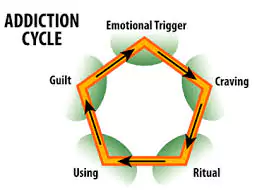 We hear the word “addiction” passed around by our friends, the media, and our families. Specialists—such as sociologists or psychologists—constantly reveal new forms of addiction, referring to various kinds of activities. Besides such omnipresent forms as addiction to drugs, alcohol, tobacco, or gambling, today experts also have distinguished addictions to the Internet, mobile technologies, computer games, work, sex, television, caffeine, and many subjects. Sometimes people confuse the meaning of the term “addiction” and may use it to indicate their habitual activities, or hobbies. Yet, not any repeated behavior is a manifestation of addiction. Therefore, the meaning of this term should be clarified.
We hear the word “addiction” passed around by our friends, the media, and our families. Specialists—such as sociologists or psychologists—constantly reveal new forms of addiction, referring to various kinds of activities. Besides such omnipresent forms as addiction to drugs, alcohol, tobacco, or gambling, today experts also have distinguished addictions to the Internet, mobile technologies, computer games, work, sex, television, caffeine, and many subjects. Sometimes people confuse the meaning of the term “addiction” and may use it to indicate their habitual activities, or hobbies. Yet, not any repeated behavior is a manifestation of addiction. Therefore, the meaning of this term should be clarified.

✅ AI Essay Writer ✅ AI Detector ✅ Plagchecker ✅ Paraphraser
✅ Summarizer ✅ Citation Generator
The forming of an addiction does not imply a unique mechanism of getting used to particular occupations or substances. On the contrary, experts often distinguish psychological and physical aspects of addiction. They can be interconnected (as in the case of alcohol or drug addiction), or be manifested without interconnection (Internet addiction). In other words, when talking about addiction, we should mind it can either refer to a substance dependence or behavioral malfunctions.
What is a psychological or behavioral addiction then? According to the website of the American Society of Addiction Medicine, it is a chronic disease of brain reward, motivation, memory, and related circuitry, which is reflected in an individual pathologically pursuing reward and/or relief by performing certain actions (ASAM). The Collins English Dictionary defines addiction as a condition of being abnormally dependent on a certain habit. Psychological addiction is followed by such symptoms as an individual becoming obsessed with an object or activity; engaging in the activity or habitual behavior even if it is potentially harming; denying problems connected to the addiction and hiding the addictive behavior from others; and several others (Indiana University). Therefore, based on the aforementioned statements, we can say psychological addiction is a pathological condition of the mind, which is characterized by an excessive dependency or obsession on a certain object or action and ignoring the potential dangers of addictive behavior.
The physical aspect of an addiction is characterized with a continued use of certain substances even when significant problems related to their use develop (Wexner Medical Center). As a result, bodies of such addicts cannot tolerate without new doses of drugs, alcohol, etc. Since people with an addiction (substance dependence in particular) have little or no control over their obsessions (Medical News Today), physical addiction can be defined as a constant need to intake certain substances to satisfy one’s craving, even though this may be harmful for the addict, who often is unable to control the craving.
Combining the two definitions we have distilled, we can define the phenomenon of addiction as a mind pathology characterized by an obsession of certain actions, objects, or substances, which brings addicts temporary satisfaction while often being harmed by them, but over which they have little or no control.
References
“Definition of Addiction.” American Society of Addiction Medicine. N.p., n.d. Web. 20 Sept. 2013. <http://www.asam.org/for-the-public/definition-of-addiction>.
“What are Addictive Behaviors ?” Indiana University. N.p., n.d. Web. 20 Sept. 2013. <http://www.indiana.edu/~engs/hints/addictiveb.html>.
“Substance Abuse/Chemical Dependency.” Wexner Medical Center. N.p., n.d. Web. 20 Sept. 2013. <http://medicalcenter.osu.edu/patientcare/healthcare_services/mental_health/mental_health_about/substance/Pages/index.aspx>.
“All About Addiction.” Medical News Today. MediLexicon International, 03 May 0032. Web. 20 Sept. 2013. <http://www.medicalnewstoday.com/info/addiction/>.
Follow us on Reddit for more insights and updates.





Comments (0)
Welcome to A*Help comments!
We’re all about debate and discussion at A*Help.
We value the diverse opinions of users, so you may find points of view that you don’t agree with. And that’s cool. However, there are certain things we’re not OK with: attempts to manipulate our data in any way, for example, or the posting of discriminative, offensive, hateful, or disparaging material.
Comments are closed.